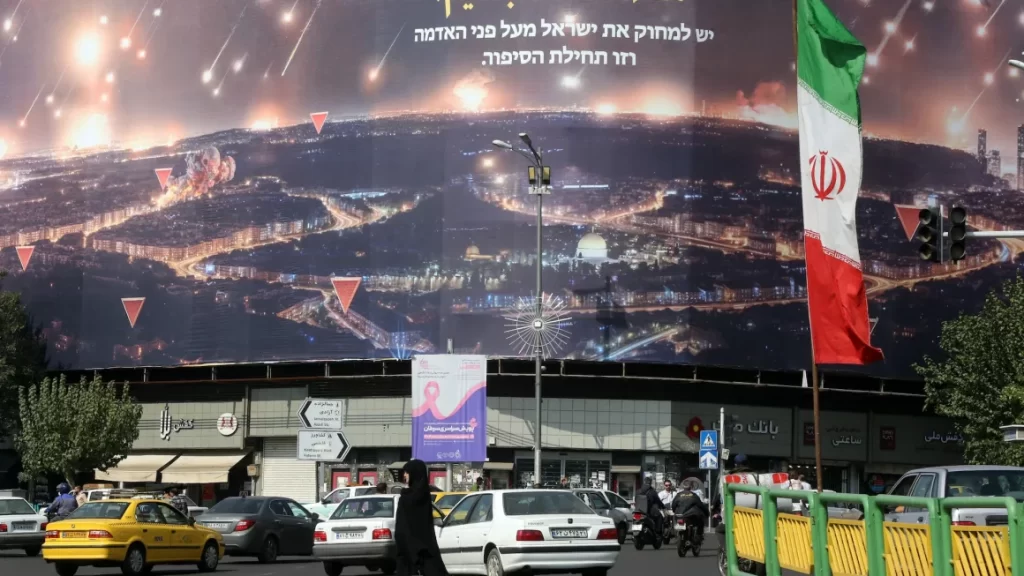
As tensions escalate following a missile attack by Iran earlier this month, the Iranian government is urgently engaging in diplomatic discussions with various Middle Eastern countries. The aim is to assess ways to mitigate Israel’s potential response and, if necessary, secure assistance for Tehran. Sources familiar with the situation revealed Iran’s growing anxiety over whether the U.S. can persuade Israel to refrain from targeting its nuclear facilities and oil infrastructure. Compounding this concern is the significant weakening of Hezbollah, Iran’s primary proxy militia in the region, due to recent Israeli military operations.
The U.S. has been in close consultation with Israel regarding its planned retaliation to Iran’s October 1 missile strike. U.S. officials have emphasized that they do not want Israel to target Iranian nuclear sites or oil fields. President Joe Biden recently spoke with Israeli Prime Minister Benjamin Netanyahu for the first time in nearly two months, urging a “proportional” response to Iran’s actions.
Gulf allies of the U.S., including the United Arab Emirates, Bahrain, and Qatar, have expressed worries about potential attacks on Iranian oil facilities, fearing significant economic and environmental repercussions for the region. An Arab diplomat indicated that these nations are keen to avoid further escalation, underscoring the precariousness of the situation.
The Biden administration is particularly concerned about the ongoing cycle of retaliatory attacks between Iran and Israel, which began after Israel struck what Iran claimed was its consulate in Damascus. There are fears that these skirmishes could escalate into a full-blown regional war, dragging the U.S. into the conflict. Adding to the tension, U.S. influence over Israel appears to be waning, as Israel increasingly disregards calls for restraint from Washington. In Lebanon, for instance, Israel’s aggressive military actions have resulted in significant casualties, with over 1,400 people reported killed since late last month.
An Israeli official noted that Israel’s security cabinet has yet to decide on its course of action. While the gap between U.S. and Israeli positions may be narrowing, uncertainties remain. A senior U.S. administration official expressed skepticism about the transparency of Israel’s discussions, suggesting that the U.S. cannot fully trust the details being shared.
As of last week, Israel had not confirmed whether it would refrain from targeting Iranian nuclear facilities. Historically, Israel has been preparing for potential strikes on Iran’s nuclear capabilities, even simulating such attacks in military exercises just two years ago. Furthermore, Israel is believed to have carried out targeted assassinations of Iranian nuclear scientists and has been involved in cyberattacks against Iranian nuclear facilities, with the Stuxnet virus being one of the most notable examples.
Israeli Defense Minister Yoav Gallant issued a stark warning regarding Israel’s imminent response, asserting, “Our strike will be powerful, precise, and above all – surprising. They will not understand what happened and how it happened.”
The Gulf states are generally hesitant to get embroiled in the conflict. While Iran has threatened to treat any nation supporting Israel as an aggressor, it seems unlikely that its neighbors would come to Tehran’s defense in the event of an Israeli strike. Notably, Saudi Arabia, the UAE, and Qatar have communicated to both the U.S. and Iran that they will not allow Israel to utilize their airspace for attacks on Iran. Jordan, too, has stated it will protect its airspace from unauthorized incursions.
The U.S. does not believe Iran seeks a full-scale war with Israel. Iran’s Foreign Minister, Abbas Araghchi, recently claimed that Netanyahu is the only party eager for conflict. Despite these assertions, the U.S. has discreetly urged Tehran to carefully consider its response should Israel retaliate.
Qatar has been active in relaying messages between the U.S. and Iran, although officials acknowledge that predicting Iran’s next move remains uncertain. Different factions within Iran have varying views on how to react, dependent largely on the nature of Israel’s anticipated actions.
Amid these tensions, Iran is particularly keen on soliciting Saudi Arabia’s assistance to prevent an Israeli strike, hoping the Saudis can leverage their influence with Washington. Diplomatic meetings between the two countries have increased, with Araghchi visiting Saudi Arabia to discuss regional issues and address concerns over Israeli actions in Lebanon and Gaza.
As the world watches closely, Israel finds itself in a moment of reflection as it observes Yom Kippur, the holiest day in Judaism. During this period, the nation effectively comes to a standstill, with businesses, public transport, and airports closing, adding an additional layer of complexity to the unfolding geopolitical situation.








